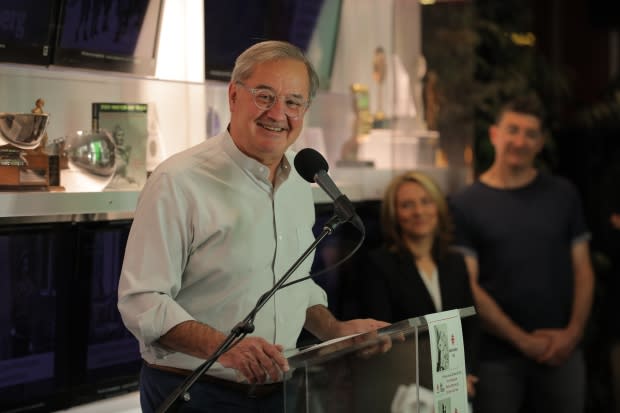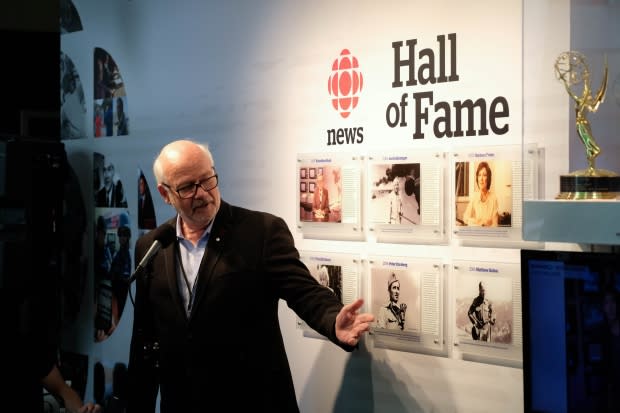Wartime correspondents inducted into CBC News Hall of Fame

Second World War correspondents Matthew Halton and Peter Stursberg, who offered unvarnished from-the-field reporting that let Canadians know what was happening on the battlefields during the liberation of Europe, are the latest inductees to the CBC News Hall of Fame.
The two were posthumously honoured at a ceremony at the CBC's Toronto Broadcasting Centre on Friday, just over a week after ceremonies commemorating the 75th anniversary of D-Day.
"As we actively remember what Canadians went through in the Second World War — both the soldiers and the families back home — we owe a debt to those who sent back descriptions that were so acute, so haunting … that Canadians listening in were virtually transported to those battlefields of Europe," said senior correspondent and The National co-host Adrienne Arsenault, who emceed Friday's ceremony.
"There probably wasn't a household in this country that wasn't relying on this sort of reporting."
It was the work of pioneering journalists like Matthew Halton and Peter Stursberg that helped build the public broadcaster into a vital institution, said David Halton, the retired CBC correspondent who followed in his father's footsteps and represented him at Friday's ceremony.
And they did so in just a few years.

Halton recalled that in September 1939, after breaking into regular programming to announce Canada's decision to go to war against Nazi Germany, the CBC radio announcer promptly returned listeners to the music — a song called Inka Dinka Doo. At that time, there were no reporters to analyze or provide context for what was one of the most important decisions in Canadian history, Halton said, and CBC was criticized for it.
Shortly thereafter, however, the public broadcaster put resources into building a news bureau, and it was the "vivid reporting" of Halton Sr., Stursberg, and their peers that helped reverse CBC's poor initial image. By 1944, Halton said, a survey showed that a vast majority of English Canadians with radios tuned into CBC for news from the front.
Working first in print, then as a radio reporter, Matthew Halton covered the rise of the Nazi regime from the early 1930s. He went on to report about the Second World War from Egypt, through the battlefields of Italy and Normandy, and elsewhere in Europe, as the war concluded.
He died in 1956 at age 52.
Peter Stursberg was the first journalist to cover Canadian troops in combat as they landed in Italy, bringing the sounds of the front to listeners at home. He continued his coverage from France and elsewhere during the liberation of Europe from Nazi occupation and was one of the few reporters to visit the bunker of Adolf Hitler.
Both then and now, said David Halton, "Canadians have had a different perspective on the world than, say, the Americans or others. We have our distinct national perspective, and that's why it's so important to have Canadian reporters and correspondents reporting on international news through the prism of Canadian eyes."
It's vital, he said, for Canadian journalists to continue to prioritize — as his father did — being on the ground to cover international events of historic importance.
"Nowadays, with so much emphasis on speed and a plethora of platforms, it's more difficult for reporters to actually get out and bear witness and provide context," Halton said.
"But it's more important than ever that the first-hand reporting be done, because it makes such a difference. There's no substitute for it."
'This kind of recognition would have been spectacular'
Stursberg's son Richard, a former executive vice-president of CBC English services, said his father "would have been "very, very pleased" at being recognized for his contribution to Canadian journalism.

Throughout a lengthy career in journalism, he also wrote 15 books on everything from politics and the news business to his days as a war correspondent and his family's complex relationship with China, where he was born.
In 2014, Stursberg died at the age of 101.
"He was a guy who spent a lot of his life, his entire life, really, as a journalist and a writer," said Richard Stursberg.
"And one of the things you want, as a journalist and a writer, is recognition for the work you do … This kind of recognition would have been spectacular for him."
'A lasting impact'
After the death in 2014 of Knowlton Nash, CBC News established its Hall of Fame to honour individuals who "demonstrated a lasting impact on the CBC and Canadian journalism," CBC News editor-in-chief Jennifer McGuire said at the ceremony.

A year later, Nash — a former anchor and chief correspondent for The National — became the first inductee. He was followed by former foreign correspondent Joe Schlesinger, and Barbara Frum, who hosted As It Happens and The Journal. Last year, trailblazing journalist-turned-executive Trina McQueen was inducted.
McQueen was among the contingent of former CBCers who gathered with current staff for Friday's event. She was joined by Peter Mansbridge, Tony Burman, Brian Stewart, Peter Herrndorf and others.

If learning about Halton and Stursberg's contributions through the CBC News Hall of Fame causes even one young journalist to become "interested in the institutional memory of this place," Arsenault said, "it means that the two men will remain in the service of Canadians and the CBC."
"Remembrance is not a passive thing," she said. "It is an active thing. It demands that we do something."


